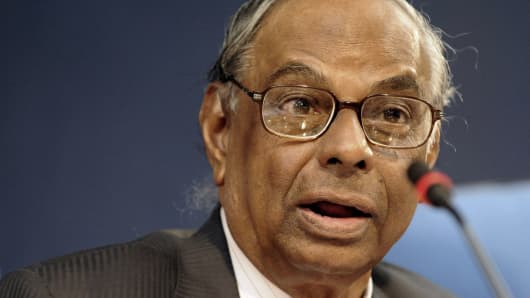First came Britain and France, then Australia and the United States.
Like gilded bowling pins against the rolling forces of global populism, the long-favorable tax policies for the wealthy are rapidly falling one by one.
And now it may be India's turn.
The chairman of the prime minister's economic advisory council, C. Rangarajan, seemed to be channeling Obama when he announced that "we need to raise more revenues and the people with larger incomes must be willing to contribute more."
(Read more: 'Fiscal Cliff' Deal May Boost Charitable Giving)
He didn't identify the rate or income cut-off. But the idea has already stirred a firestorm of debate in the country, which has seen falling tax rates for high earners for much of the past decade. India's top tax rate of 30 percent was set in 1997.
Also recently, the country's former finance minister cited the need for an estate tax in India, saying the country may be seeing too much accumulation of wealth "in a few hands."
The papers are now filled with quotes from Warren Buffett and others highlighting the need for a fairer tax system amidst growing inequality. The top 10 percent of wage earners now make 12 times more than the bottom 10 percent, up from a ratio of six in the 1990s.
Critics of a new tax say it would chase away capital and jobs.
"Just because we need to increase tax revenues to meet the lower fiscal deficit targets, should we adopt the easiest method of further soaking the rich by imposing a surcharge on those who already contribute as much as 63 per cent of total revenues from personal income tax?" asked Rajiv Kumar Senior Fellow a india's Centre for Policy Research.
There is also wide disagreement on what counts as rich. After one politician cited $24,000 as "rich' in India, one commentator said that "few Indians earning (that amount) think of themselves as rich. And they are already contributing the bulk of the country's income taxes anyway. Taxing them will only sour the negative mood further."
India is, by some measures, more equal than the United States. The top one percent of earners in the United States took in more than 17 percent of total income in 2005, according to research from Thomas Picketty and Emmanuel Saez. In India, the share of income for the top one percent is around 9 percent – which is down from 12 percent in 1949.
(Read more: Rich Tax Not Likely Behind California's Deficit Magic)
Wealth, to be sure, may be far more concentrated in India. But that would be an argument more for an estate tax rather than income tax.
It is a fight that is just beginning – and will no doubt continue for months.



